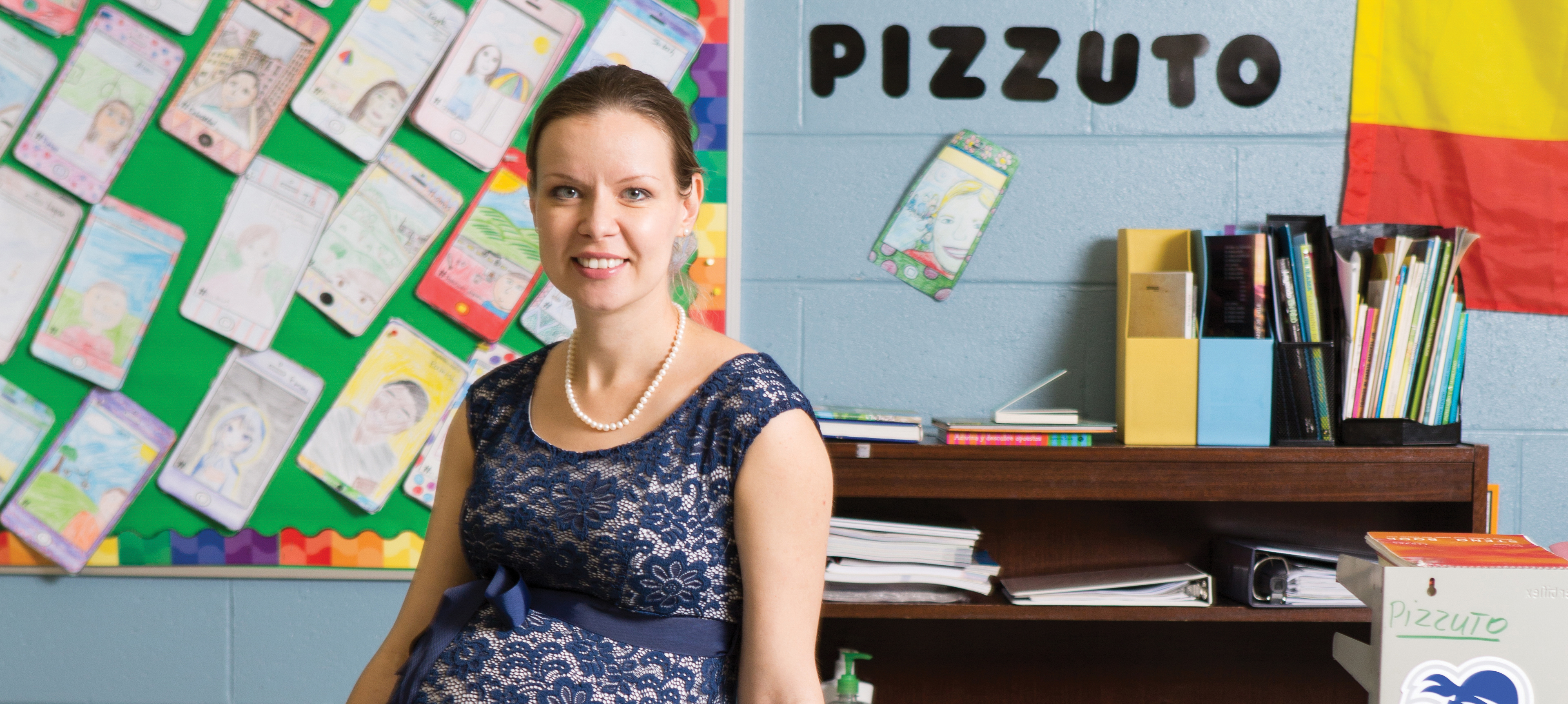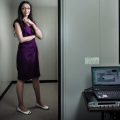In 2008, just as the Great Recession began, Daria Pizzuto lost her job. She wasn’t especially sad to leave — she hated selling cell phones. But she was a little panicked. For years she had been drifting from one unfulfilling job to the next — waitress, fast food worker, gas station attendant — and she didn’t know where to go next.
“At the time I was devastated,” Pizzuto says. But the layoff was a blessing in disguise. It forced her to hunt for a new job, and she finally landed a position where she could use her degree in Spanish literature, teaching Spanish at an alternative high school. Despite a rough first year, she knew she had found her calling.
Now, nearly a decade later, Pizzuto teaches middle school Spanish in Basking Ridge and is also pursuing her Ph.D. in Higher Education Leadership, Management, and Policy. Last spring she received the ultimate validation that she is on the right path: a Fulbright award. When she found out she had been selected, “I just started crying,” she says. “I couldn’t believe I got it.”Joseph Stetar, a professor in Pizzuto’s program who encouraged her to apply, wasn’t surprised. “She’s extremely motivated and intellectually engaged,” he says.
The Fulbright Distinguished Awards in Teaching Program gives teachers funding to travel abroad so they can complete an ambitious research project of their choosing. Pizzuto hoped to track down authentic Spanish literature to incorporate into her lesson plan. So she proposed a trip to Chile, a country famous for its rich literature.
In the U.S., Spanish language students read very little, Pizzuto says. “When they do read, they don’t read authentic stories.” Instead they rely on textbooks or books translated from English. These materials don’t give students a sense of the vivid language or culture that exists in Spanish-speaking countries.Authentic Spanish literature is easy to find online, of course.
Even obscure books are only a mouse click away. “But to have a book and to be able to teach with that book are completely different things,” Pizzuto says. She wanted to not only find authentic literature, but also understand how teachers use it in the classroom — how do they introduce the book, how do they assess students after they’ve finished reading it, how do they drill the vocabulary, how do they teach cultural concepts?
From March through July — which includes the coldest months in South America — Pizzuto visited 13 schools across Chile. She was struck by the dedication of the teachers, who work long hours under often difficult conditions. For example, only one of the 13 schools she visited had a heating system. “In spite of all these challenges and difficulties, they still had the drive, motivation, and professionalism to keep going and develop wonderful lessons,” she says. “That, to me, was so inspiring.”
When she came home, Pizzuto adapted the material to fit the needs of her students. The final product is a series of ready-to-use lessons and activities that rely on Chilean children’s literature. “It’s not a paper that will stay on the shelf,” she says. “It’s extremely practical.”Pizzuto’s project is “really innovative,” says Emily Spinelli, executive director of the American Association of Teachers of Spanish and Portuguese.
Middle school Spanish teachers don’t typically use literature in the classroom. Pizzuto’s lessons will help teachers take authentic literature and “bring it down to a level that middle school students could understand,” she says. And that might inspire kids to more fully engage. “They’re more motivated to read it than some of the textbooks, which can be bland,” Spinelli says. One of the things that sets Pizzuto apart is her international perspective, Stetar says.
“There’s a tendency among some American students to be insular, and Daria was not that way,” he says. That comes in part from Pizzuto’s unique background. She was born and raised in Russia, and when she was 12, her family moved to Spain for four years. Pizzuto didn’t speak any Spanish, but she had always loved languages and she picked up the basics quickly.
Today, Pizzuto speaks three languages fluently and has visited 17 countries. As a teacher, she wants her students to sample some of the rich culture that she has experienced. She wants her students to know the name of the first Chilean to win the Nobel Prize in Literature even if they can’t leave New Jersey. “I’m trying to make them into independent thinkers,” she says, “but also worldly and well-rounded thinkers.” And there’s little doubt she will succeed.
By Cassandra Willyard







